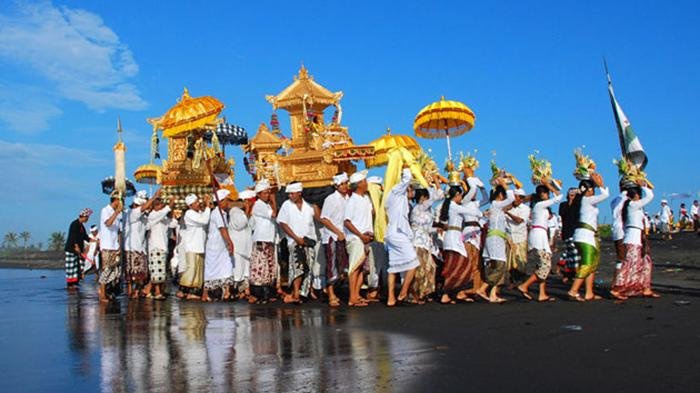Balinese Hindu Nyepi Ceremony

Bali’s Hindu Day of Silence
Balinese Hindu Nyepi Ceremony. Nyepi, Bali’s Hindu Day of Silence, is one of the most significant and unique religious holidays in the Balinese calendar. Marking the Balinese New Year, Nyepi is unlike any other celebration, as it is observed with complete silence, fasting, and meditation. The island of Bali comes to a standstill for 24 hours, and the usual hustle and bustle is replaced by a profound stillness as both locals and visitors participate in this day of reflection and purification.
In this article, we will delve into everything you need to know about Nyepi, including the calendar system used to determine Nyepi Day, the function and purpose of Nyepi, the various rituals leading up to the day of silence, and the religious and philosophical significance of this sacred event.
Calendar for Counting Nyepi Day
Nyepi falls on the Day of the New Year according to the Balinese Saka Calendar, a lunar calendar that has been used in Bali for centuries. The Saka calendar differs from the Gregorian calendar, with Nyepi typically occurring in March or April, depending on the lunar cycle. The Saka calendar year begins on the first new moon of the tenth month, marking the start of a new year for the Balinese Hindus.
Unlike New Year celebrations in other cultures, which are often festive and full of revelry, the Balinese New Year is a time of introspection and spiritual renewal. The exact date of Nyepi changes each year as it is based on the lunar phases, and it is announced by Hindu priests and religious authorities well in advance.
Nyepi is part of a larger religious event known as Hari Raya Nyepi, which is celebrated over several days. The preparations and rituals leading up to Nyepi are as important as the day itself, each serving a specific spiritual function in the process of purification and renewal.
The Function of Nyepi Day
Nyepi is observed to mark the Balinese Hindu New Year, and its primary function is to cleanse and purify the island from negative energies, evil spirits, and human impurities accumulated over the previous year. It is a time for self-reflection, meditation, and reconnecting with the divine.
While most New Year celebrations worldwide focus on new beginnings and resolutions, Nyepi emphasizes restoring balance—both within the individual and the cosmos. The observance of silence and inactivity is intended to create a space for spiritual renewal and to rid the island of negative forces.
There are four main principles, known as Catur Brata Penyepian, that guide the observance of Nyepi. These principles are:
- Amati Geni – No fire or light, including electricity. This principle symbolizes the extinguishing of worldly desires and distractions, allowing for focus on spiritual matters.
- Amati Karya – No work or physical activity. The Balinese believe that refraining from work during Nyepi allows them to dedicate themselves entirely to self-reflection and contemplation.
- Amati Lelungan – No travel. Movement is restricted, and no one is allowed to leave their homes or accommodations. The streets are empty, airports are closed, and even tourists are expected to participate in the silence.
- Amati Lelanguan – No entertainment or pleasure. All forms of entertainment and socializing are prohibited, allowing for an atmosphere of peace and spiritual focus.
By following these principles, the Balinese people aim to achieve spiritual purification and balance. It is believed that during Nyepi, evil spirits roam the island, and the lack of activity, sound, or light confuses them, leading them to believe that the island is deserted. As a result, they leave Bali undisturbed, restoring harmony and balance.
Ritual Process Before Nyepi Day

Nyepi is not just a single day of silence; it is preceded by several important rituals and ceremonies that prepare the people and the island for the New Year. Each of these rituals has its own significance, contributing to the overall process of purification and renewal.
1. Melasti Ceremony (Purification Ritual)
The Melasti ceremony is held several days before Nyepi and is one of the most important purification rituals in Balinese Hinduism. During this ceremony, sacred objects from temples (known as pratima) are carried in grand processions from the village temples to the sea, lakes, or rivers. This journey symbolizes the cleansing of both the objects and the participants, washing away impurities and sins.
Melasti is a community-wide event, with hundreds of people dressed in traditional Balinese attire walking in long processions to the water. Once they arrive, offerings are made, and priests perform blessings and prayers to purify the participants and prepare them for the upcoming Nyepi day.
The ceremony also serves as a reminder of the Balinese connection to nature, as water is seen as a source of life and purification. The ritual emphasizes the importance of maintaining harmony between humans, nature, and the gods.
2. Tawur Kesanga (The Great Sacrifice)

The day before Nyepi, a ritual known as Tawur Kesanga is performed in villages, towns, and cities across Bali. Tawur Kesanga is a sacrificial ceremony designed to appease the bhuta kala (malevolent spirits) and neutralize any negative forces that might disrupt the harmony of the island. Offerings are made to these spirits, usually in the form of food, flowers, and animals, with the goal of restoring cosmic balance.
One of the most iconic elements of this ceremony is the creation and burning of Ogoh-Ogoh, large, demon-like effigies made of bamboo, paper, and other materials. Ogoh-Ogoh represent evil spirits, and their creation is a symbolic act of capturing these negative forces. During the night, the Ogoh-Ogoh are paraded through the streets in elaborate processions, accompanied by traditional music and chanting.
After the procession, the Ogoh-Ogoh are burned or destroyed, symbolizing the destruction of evil and the cleansing of the island from negative influences. This event is highly festive and draws large crowds, making it a stark contrast to the silence of Nyepi that follows.
3. Pengerupukan (Exorcising Evil Spirits)
After the Tawur Kesanga ceremony and the Ogoh-Ogoh procession, the Pengerupukan ritual is performed, which involves making noise to drive away any lingering evil spirits. People bang pots and pans, light fireworks, and burn incense to create a loud and chaotic atmosphere, intended to scare away any negative forces that have not yet been banished.
Once Pengerupukan is complete, the island prepares for the day of silence, with all activity ceasing as night falls.
Religious and Philosophical Meaning of Nyepi Day
Nyepi carries deep religious and philosophical significance for the Balinese Hindus. It is a day not only for physical rest but also for spiritual purification and introspection. The silence and inactivity allow individuals to focus on their inner selves and reconnect with the divine.
1. Self-Reflection and Spiritual Cleansing
Nyepi is seen as a time for self-reflection, where individuals are encouraged to examine their lives, relationships, and actions over the past year. By reflecting on their personal behavior and spiritual journey, they can identify areas for improvement and seek purification of their mind, body, and soul.
The silence of Nyepi serves as a tool for meditation and spiritual cleansing. Without the distractions of daily life—such as work, social interactions, and entertainment—people can focus on their spiritual well-being and cultivate inner peace.
2. Balance Between Good and Evil
The philosophical concept of Rwa Bhineda, the balance between opposing forces (good and evil, light and darkness, life and death), is central to Nyepi. The day represents the cosmic battle between Dharma (righteousness) and Adharma (unrighteousness), with the observance of silence symbolizing the victory of Dharma.
By refraining from activity, the Balinese believe they can restore balance in both the physical and spiritual realms, ensuring harmony for the coming year. This balance is essential for the well-being of the individual, the community, and the island as a whole.
3. Connection with Nature
Nyepi also emphasizes the Balinese people’s deep connection with nature. By shutting off lights, stopping all forms of transport, and minimizing energy use, Nyepi serves as a form of environmental mindfulness. The island’s temporary cessation of activity allows nature to “breathe,” offering a day of rest not just for people but also for the environment.
This connection between humans and nature is a key tenet of Tri Hita Karana, the Balinese Hindu philosophy that stresses harmony between humans, nature, and the gods. Nyepi is a practical demonstration of this principle, as the day of silence encourages respect and care for the natural world.
4. Social Unity and Communal Harmony
Nyepi fosters a sense of communal harmony as the entire island participates in the observance of silence together. Regardless of caste, social status, or occupation, all Balinese Hindus are united in their shared practice of meditation, fasting, and reflection. This collective observance strengthens the bonds between individuals, families, and communities, promoting unity and peace across the island.
Even non-Hindu residents and tourists are encouraged to participate in the day of silence, respecting the traditions of the Balinese and contributing to the island’s overall atmosphere of tranquility.
Conclusion: Nyepi as a Time for Silence, Reflection, and Renewal
Nyepi is one of the most unique and spiritually significant events in Bali’s religious calendar. Its emphasis
on silence, introspection, and balance sets it apart from traditional New Year celebrations around the world. For the Balinese, Nyepi is a day to reconnect with their inner selves, purify their souls, and restore harmony with the cosmos.
The rituals leading up to Nyepi, such as the Melasti purification ceremony and the dramatic Ogoh-Ogoh processions, add depth and meaning to the day of silence. Nyepi is not just about abstaining from activity; it is a time for the island to heal, both spiritually and physically, and for its people to realign themselves with the values of Dharma and the principles of Tri Hita Karana.
For visitors to Bali, experiencing Nyepi offers a rare opportunity to witness and participate in a sacred tradition that exemplifies the island’s deep-rooted spirituality and commitment to harmony. Whether through quiet meditation, observing the rituals, or simply respecting the silence, Nyepi provides a profound insight into the heart of Balinese Hindu culture.










Leave a Review